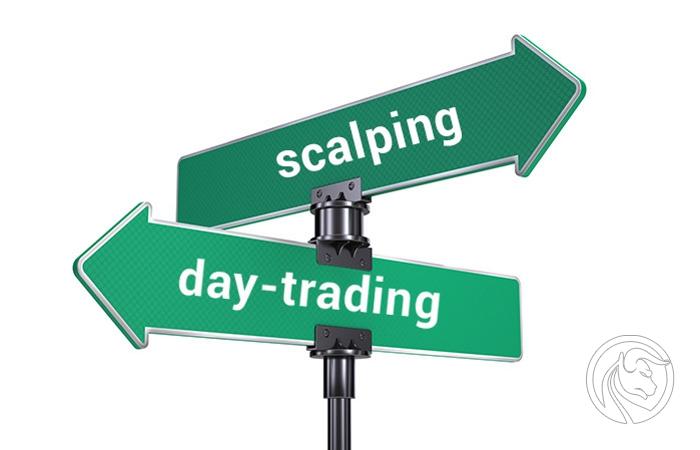Day-trading and scalping - where are the differences and which is better?
Recently, I have encountered the dilemma of a beginner trader who did not know which type of trading is more suitable for him - day trading or scalping. The problem was that he didn't really know the differences between the two trading styles, except that everything takes place during one trading session. So today I will try to explain it to you and point out what is better.
Daytrading and scalping have a lot in common. You can even apply an analogy from math lessons, where one of the theorems says that not every rectangle is a square but every square is a rectangle. Similarly here - every scalping is a kind of day-trading, but not all day-trading is necessarily scalping. The basis of both approaches is the condition not to hold positions until the next session, i.e. in the case of manual trading, transactions are concluded only under the supervision of the trader.
Daytrading, which means closing the position to the end of the day
The very idea of closing positions by the end of the day is due to two simple factors. First, at night you usually sleep. Therefore, it is not possible to monitor the market and make decisions on an open position on an ongoing basis. You can help yourself pending orders, trailing stop or vending machines but it doesn't do the job with every strategy. And here comes the lack of control that the trader wants to avoid.
READ NECESSARY: Swing Trading with an advantage over day-trading?
The second issue it is the occurrence of a price gap at the opening of a new session. It is true that this does not apply to currency pairs that are quoted continuously from Sunday to Friday closing, but if we decide to trade on stocks, indices or some commodities, the occurrence the price gap at the morning opening is a standard phenomenon. Of course, you can earn extra money on it, but also lose it, and the day-trader wants to eliminate this additional risk.
In the beginning there was nothing ...
... and then there was daytrading (DT). This approach to trading has been known for a long time, especially on the regulated stock market, where to this day brokerage houses very often offer investors lower commission rates for positions that will be opened and closed during the same trading session. Scalping, on the other hand, is an evolution of day trading that likely came along with more volatile leveraged markets. There is no need to dwell on DT itself, because there are no more strict rules here. So let's move on to scalping. The first problem is the lack of a uniform definition of scalping. You can only meet with general descriptions, which I am about to provide, or individual interpretations of brokers who, for example, prohibit scalping on their trading platforms and thus had to stiffer in their regulations what is "scalping" for them and what is not.
Scalping is the conclusion of many transactions with a very short life span counted from a second to a few minutes, where usually the closure takes place on a small profit or a small loss.
This is the easiest way to define what scalping is. The duration of the scalp position is different. Usually it is 5-7 minutes. The range of realized loss or profit for major currency pairs it is from 0.0 to 10.0-15.0 pips. It does not matter how the transaction is concluded - whether they will be pending orders, a script or a machine, or transactions concluded with the so-called "Finger". The graphs are analyzed at low intervals, from ticks, for seconds to a maximum of several minutes. This approach means that many trading signals are generated during one day, which translates into the number of positions. The average scalper can open from several to several dozen positions a day.
"I will earn more on scalping"
The basic mistake is to imagine that more trades also guarantee more profit. Nothing similar. Many positions closed with a small profit mean that the share of transaction costs (spread, commission) is much greater than in the case of day trading. Assuming that on average we earn 5.0 pips on one position from scalping and from this balance we give 1.0 pips in fees, with 10 transactions our profit will be 40.0 pips, and the costs accounted for as much as 20% of the total. And these costs must be "made up" anew each time, while a similar profit can be earned with one item and the costs covered only once.
READ ALSO: SCALPING - is it worth it?
The advantage of scalping is the large number of signals that an experienced trader can diagnose as "better" and "worse", which increases the chance of success.
Is scalping bad?
You may ask yourself "why would the broker prohibit scalping?" It is logical - more trades mean more income from the spread and / or commission. The answer is very simple. It happens that such bans are introduced Market Maker brokerswhere this order execution model assumes that we conclude our transaction directly with the broker. Then the broker, on its own behalf, secures (or at least should have secured) ECN market. Most often, the exposure of all customer positions is summed up and only their "hill" is hedged to balance the balance sheet. In the case of very short transactions, such as in the case of scalping, the broker may have a problem to effectively balance the said risk exposure. As a consequence, this leads to his loss when the scalper begins to earn, as it becomes the final party to the transaction. Therefore, it is worth finding out if our broker does not prohibit this type of trade. Violation of the regulations may result in the withdrawal of concluded transactions, the exclusion of trading options or, in extreme cases, even the termination of the contract.
What should I choose ...
Both forms of trading are intended for people who have a lot of time to trade during the day. In daytrading, after opening a position, it may be associated with even several hours of monitoring the situation and waiting for an appropriate reaction. Similarly, with waiting for a signal to conclude it. In scalping you can say that it gets a bit better with time. Usually there are many signals, and the items themselves "live" much shorter. So theoretically, depending on when we sit down at the platform, then there is trade. But something for something - when scalping it is difficult to talk about the possibility of browsing the press or other activities at the same time - our attention is focused in 99% on trading, and a minute of inattention is sometimes equivalent to missing a good trading signal.
Without a doubt - scalping is dedicated primarily to people with more experience in trading, and above all to traders who have no problem with keeping their emotions in check and following only the guidelines resulting from their system. A very common mistake is to fall into a vortex of transactions that go beyond a specific methodology, especially after a series of losses, when the trader wants to break off as soon as possible.
| Day-Trading | Scalping |
|
|
If you have trouble controlling your emotions in stressful situations, you lack consistency and discipline, you don't know the market well enough to quickly analyze changing market conditions and make decisions in a maximum of several seconds, then scalping is not for you yet. Start with day trading and soak up the experience to become a professional scalper over time!






















![Forex Club – Tax 9 – Settle tax on a foreign broker [Download the Application] Forex Club - Tax 9](https://forexclub.pl/wp-content/uploads/2024/02/Forex-Club-Podatek-9-184x120.jpg?v=1709046278)
![Trading View platform – solutions tailored to the needs of traders [Review] trading view review](https://forexclub.pl/wp-content/uploads/2024/03/trading-view-recenzja-184x120.jpg?v=1709558918)
![How to connect your FP Markets account to the Trading View platform [Guide] fp markets trading view](https://forexclub.pl/wp-content/uploads/2024/02/fp-markets-trading-view-184x120.jpg?v=1708677291)
![How to invest in ChatGPT and AI? Stocks and ETFs [Guide] how to invest in chatgpt and artificial intelligence](https://forexclub.pl/wp-content/uploads/2023/02/jak-inwestowac-w-chatgpt-i-sztuczna-inteligencje-184x120.jpg?v=1676364263)




![Izabela Górecka – “Success on the market depends not only on knowledge, but also on emotional stability” [Interview] Izabela Górecka - interview](https://forexclub.pl/wp-content/uploads/2024/04/Izabela-Gorecka-wywiad-184x120.jpg?v=1713870578)
![WeWork – the anatomy of the collapse of a company valued at $47 billion [WeWork, part II] wework bankruptcy story](https://forexclub.pl/wp-content/uploads/2024/04/wework-bankructwo-historia-184x120.jpg?v=1711729561)
![Adam Neumann – the man who screwed up Softbank [WeWork, part AND] adam neumann wework](https://forexclub.pl/wp-content/uploads/2024/04/adam-neumann-wework-184x120.jpg?v=1711728724)




![The most common mistakes of a beginner trader - Mr Yogi [VIDEO] Scalping - The most common mistakes of a beginner trader - VIDEO](https://forexclub.pl/wp-content/uploads/2024/03/Scalping-Najczestsze-bledy-poczatkujacego-tradera-VIDEO-184x120.jpg?v=1711601376)
![Learning patience: No position is also a position - Mr Yogi [VIDEO] Scalping - Learning patience - No position is also a position - VIDEO](https://forexclub.pl/wp-content/uploads/2024/03/Scalping-Nauka-cierpliwosci-Brak-pozycji-to-tez-pozycja-VIDEO-184x120.jpg?v=1710999249)
![When to exit a position and how to minimize losses - Mr Yogi [VIDEO] Scalping - When to exit a position and how to minimize losses - VIDEO](https://forexclub.pl/wp-content/uploads/2024/03/Scalping-Kiedy-wyjsc-z-pozycji-i-jak-minimalizowac-straty-VIDEO-184x120.jpg?v=1710336731)





![Day Trading or Scalping? Money Management – Mr Yogi, part 2 [VIDEO] Money Management - MrYogi. Time frames and position size risk](https://forexclub.pl/wp-content/uploads/2023/11/Money-Management-przedzialy-czasowe-v2-300x200.jpg?v=1701591046)

![Day Trading or Scalping? Speculation on low intervals – Mr Yogi, part 1 [VIDEO] Daytrading or Scalping - speculation on low TFs](https://forexclub.pl/wp-content/uploads/2023/11/Daytrading-czy-Scalping-spekulacja-na-niskich-TF-v3-300x200.jpg?v=1701590982)












Leave a Response